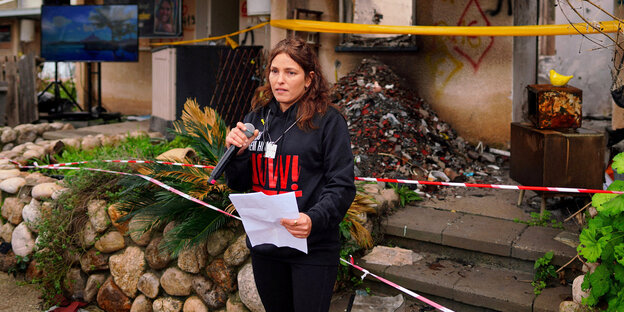Israeli Amit Soussana testified about his hostage in Gaza. He experienced sexual abuse, torture and humiliation.

Alexandre Meneghini, abducted by Hamas on October 7, speaks in front of her destroyed home in Kibbutz Kfar Aza on January 29, 2024. Photo: Alexandre Meneghini/Reuters
I avoid this column. Not because of laziness or boredom, but because it causes me pain. I want to hide them, repress them. So I hang up the clothes, make coffee, one at a time, go for a walk. I think: Why did I actually do it? Yo Efforts? Am I not taking myself too seriously? My body wants to run away, but my mind keeps spinning around what I have read and can't forget.
For almost six months, extreme violence has been so present in my daily life that I sometimes forget what it was like before this turning point. Violence became the theme of my work on October 7; Is it present, sometimes less and more subtly, in public spaces because anti-Semitism can become so common and sometimes life-threatening? Violence is present in images that my unconscious conjures up in my dreams, only they are not dream images, but real ones produced by the Hamas terrorists who once flooded the Internet.
This week I read what Israeli Amit Soussana said. New York Times has described. While held hostage in Gaza, he suffered sexual abuse, torture and humiliation. Amit Soussana is the first woman to speak publicly about sexual violence perpetrated by Hamas terrorists since October 7.
In a private house, home to civilians in Gaza, the terrorists kept her chained, she says. Her security guard forced her at gunpoint to perform a sexual act on him, they said. New York Times Soussana's statement. In another hideout, her hands and feet are tied, her mouth and nose are taped shut, and several men beat her, over and over again.
the only weapon
On October 7, Amit Soussana fought against his captors. Weeks ago I saw a video circulating on the Internet showing this fight for survival. I stared at my screen in shock, not understanding how this woman had the strength and courage to face seven men with her body, the only weapon she had left at that moment. Seven men: that's what it took to finally defeat Amit Soussana. They hit her so hard that her eye socket, cheekbones, knee and nose were broken.
In a second, on October 7, Amit Soussana went from an ordinary woman to a Hamas hostage, to a former hostage, to a victim of sexual abuse, to a brave woman. People now write about how brave Amit is. And they are right: Amit Soussana is a brave woman. And yet, this statement surprises me. Not the attribution, this adjective, but the pure necessity of it.
Amit Soussana says that with his presentation he wants to draw attention to the suffering of the more than 130 hostages still in the hands of Hamas. In a better world I wouldn't have to have that courage because there would be no hostages. In a better world, as an Israeli woman, she could be sure of the solidarity of all the women's rights organizations that would tell her “We believe you” and not “buts.”
Deserves a better world
To this day, people write to me: Prove that sexual violence happened! O: If it's true, why don't the victims speak out? As if the public had the right to survivors' testimonies. As if they owed us something.
Reading news like this makes me want to run away again. I usually walk in circles outside a few times, move things around the house, and then decide to stay, respond, and read. Because I wouldn't even know where to run. And because Amit Soussana deserves a better world.